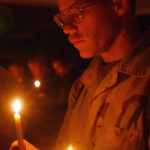We run our website the way we wished the whole internet worked: we provide high quality original content with no ads. We are funded solely by your direct support. Please consider supporting this project.

The (Spiritual) War on Terror
Jesus’ ministry was a ministry not of resignation but of revolt. He was about revolting against the cruel tyranny of a world ruler (Satan) that was oppressing God’s people. He was about seeking to give back to people, and to win back for his Father, what the enemy had stolen and destroyed. He was about restoring humanity to its rightful place of dominion over the earth, and thus about empowering humans to rise up against the cosmic thief who had stolen this from them.
Jesus’ very being, and certainly his deeds and his teaching, were about training us to revolt against the enemy in order to make our circumstances a place where we can discern the hand of God. From this perspective, we must never pray to accept “as from the father’s loving hand” any evil event.
We ought rather to pray to change things. Many think that the purpose of prayer is not to change God or to change things but only to change us. And while it sounds pious, it’s altogether unscriptural.
The primary purpose of prayer, as illustrated throughout Scripture, is precisely to change the way things are. Crucial matters, including much of God’s own activity, are contingent upon our prayer.
The prayer of the righteous is powerful and effective (James 5:15-16). Whether we pray, how faith-filled our prayer is, how persistent it is and even how many people agree together in prayer are all factors that have a real effect in getting God to move and thus in changing the world. Jesus attached real urgency to prayer (see Lk 11:5-13; 18:1-8) and believers are therefore to strive to be involved in it on a nonstop basis (1 Thess 5:17).
According to Scripture, prayer can save a nation (Ex 32;10-14), and the lack of prayer can destroy it (Ezek 22:30). Faith-filled prayer moves God to bless, and the lack of prayer hinders it (2 Chron 30:18-20; Lk 18:1-8). Faith-filled prayer empowers one to free other people from demons, while the lack of faith-filled prayer leaves these very people enslaved.
In the midst of the spiritual war, things genuinely hang upon what free, morally responsible beings do or do not do. To expand God’s kingdom is to revolt against the kingdom of evil and the main thing that we do, as Jesus both teaches and demonstrates, is to exercise prayer and faith. When disciples do this, no demonic obstacle to the kingdom, however formidable, can stand in their way (Mt 21:21-22).
—Adapted from God at War, 201-205
Image by _Pek_ via Flickr.
Category: General
Tags: Open Theism, Prayer, Warfare Worldview
Related Reading

How can you put your trust in a God who’s not in control of everything?
Question: I read your book Is God to Blame? and found it to be very compelling. It’s rocking my world. But I’m also finding I’m now having trouble trusting God like I used to. I used to believe that God ordained or at least foreknew all that was going to happen. Now I’m questioning this,…

What Hinders Answers to Prayer
Prayer is powerful and effective, but it’s not magic. There is no automatic guarantee that what we’re praying for is going to come to pass, even when we’re praying with faith and in accordance with God’s will. Prayer is a form of co-laboring with God to change the world in a Kingdom direction. Yet, it’s…

Does God Still Heal?
In the ancient world Jesus was known first and foremost as an exorcist and a healer. These two activities are mentioned in every summary of Jesus’s ministry found in the Gospels. It’s common for Western Christians today to accept that infirmities (sickness, disease, injuries, disabilities and deformities) are part of God’s mysterious plan for their…

Do My Prayers Matter?
We talked about the risk God took in creating the world as he did (see previous post). The choices made by humans and spiritual agents influence what transpires in history. This sets the stage for an understanding of how our prayers have influence on what actually happens in the world. To make this point, I…

How do you respond to 1 Kings 13:2–3?
The Lord proclaims against the pagan alter of Jeroboam, “O altar, altar, thus says the Lord: ‘A son shall be born to the house of David, Josiah by name; and he shall sacrifice on you the priests of the high places who offer incense on you, and human bones shall be burned on you.’ He…

What is the significance of Numbers 16:41–48?
The day following the Korah incident (see vs. 20–35), the Israelites rebelled against Moses again, this time because they blamed him for the death of those who were judged the day before (vs. 41). The Lord was very angry because of this and said to Moses and Aaron, “Get away from this congregation, so that…
